Week 93: 9-15 Jun 1941
On Monday 9 June Australian forces in northern Palestine crossed into southern Lebanon and on into Syria, driving back Vichy French opposition. On 15 June British forces in the western Desert launched Operation Battleaxe, with a view to driving Rommel’s army back and relieving Tobruk, which was under siege from the Germans; the British were heavily defeated and had to withdraw. Finally this week, Soviet foreign minister Molotov famously dismissed intelligence reports that Germany was about to invade, declaring that “only a fool would attack Russia”.
The John O’Groat Journal reported this week that yet another foodstuff would be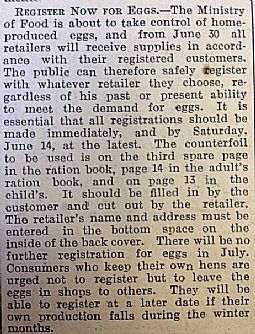 rationed, as eggs now came under the jurisdiction of the Ministry of Food. Members of the public now had to register with a retailer if they wanted to get hold of them. “Consumers who keep their own hens are urged not to register but to leave the eggs in shops to others. They will be able to register at a later date if their own production falls during the winter months.”
rationed, as eggs now came under the jurisdiction of the Ministry of Food. Members of the public now had to register with a retailer if they wanted to get hold of them. “Consumers who keep their own hens are urged not to register but to leave the eggs in shops to others. They will be able to register at a later date if their own production falls during the winter months.”
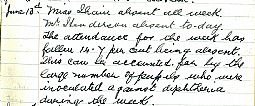 Meanwhile, schools experienced a sudden drop in attendances which many head teachers attributed to inoculations just ahead of the summer holidays. The log book of Wick North School on 13 June records: “The attendance for the week has fallen 14.7 per cent. This can be accounted for by the large number of pupils who were inoculated against diphtheria during the week.”
Meanwhile, schools experienced a sudden drop in attendances which many head teachers attributed to inoculations just ahead of the summer holidays. The log book of Wick North School on 13 June records: “The attendance for the week has fallen 14.7 per cent. This can be accounted for by the large number of pupils who were inoculated against diphtheria during the week.”
Unidentified objects were still regularly being washed up along the shores of Caithness.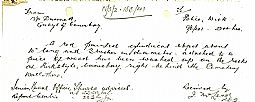 Some of these were harmless; others were unexploded mines or bombs; all had to be investigated. On 9 June the police received the following report: “A red painted cylindrical object about 10” long and 3 inches in diameter attached to a piece of wood has been washed up on the rocks at Kirkstyle, Canisbay, right behind the cemetery wall there.” The Senior Naval Officer at Thurso was advised.
Some of these were harmless; others were unexploded mines or bombs; all had to be investigated. On 9 June the police received the following report: “A red painted cylindrical object about 10” long and 3 inches in diameter attached to a piece of wood has been washed up on the rocks at Kirkstyle, Canisbay, right behind the cemetery wall there.” The Senior Naval Officer at Thurso was advised.
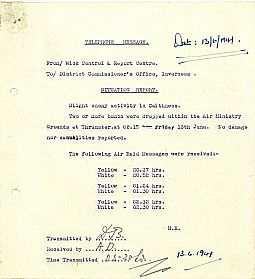 A dummy airfield had been constructed at Thrumster, just south of Wick, to lure German air attacks away from Wick airfield, especially at night. The ruse was obviously successful, for the Wick Control and Report Centre recorded, “Slight enemy activity in Caithness. Two or more bombs were dropped within the Air Ministry Grounds at 02.15 hrs Friday 13th June. No damage or casualties reported.”
A dummy airfield had been constructed at Thrumster, just south of Wick, to lure German air attacks away from Wick airfield, especially at night. The ruse was obviously successful, for the Wick Control and Report Centre recorded, “Slight enemy activity in Caithness. Two or more bombs were dropped within the Air Ministry Grounds at 02.15 hrs Friday 13th June. No damage or casualties reported.”
Finally this week, the John O’Groat Journal reported that schools across the county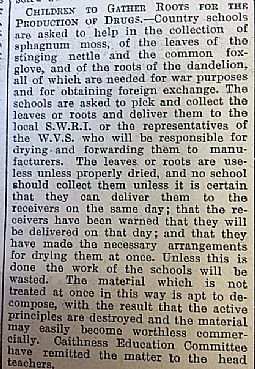 were being asked to gather roots for the production of drugs, specifically “the collection of sphagnum moss, of the leaves of the stinging nettle and the common foxglove, and of the roots of the dandelion, all of which are needed for war purposes.” Schools should only collect them if they could deliver them to the authorities immediately, as the plant materials rapidly decayed. Asking children to pick stinging nettles may seem rather hazardous; but then, of course, there was a war on.
were being asked to gather roots for the production of drugs, specifically “the collection of sphagnum moss, of the leaves of the stinging nettle and the common foxglove, and of the roots of the dandelion, all of which are needed for war purposes.” Schools should only collect them if they could deliver them to the authorities immediately, as the plant materials rapidly decayed. Asking children to pick stinging nettles may seem rather hazardous; but then, of course, there was a war on.
Coming soon! Week 94, 16th - 23rd June 1941, will be published on Monday 16th June 2014. To view previous issues please use the menus on the right hand side of the page.
Come and join us on Facebook, let us know what you think about Caithness At War, ask any questions you may have or just say hello! Click on the Facebook link below to be taken directly to our page.
www.facebook.com/caithnessarchives
Comments
First - the immunistation programme for diptheria I remember well as it was the very first time anyone of us had sight of a needle and the injections then were pretty painfull as the needles then were thick and pretty blunt as the one needle was used over and over again. They had a sterilising kit serviced by a small meth burner to boil up the needles and the whole operation was an ordeal with most of the young kids howling their heads off. There was a school doc an elderly lady who wore a real fox fur stole thing around her neck and the local district nurse attended. It was a traumatic experience and some kids had sore arms for a day afterwards and got the next day off. I can smell the meth spirit yet as it was the first time we had a whiff of the spirit.
We never collected, at Gillock, any spagnum moss etc although my wife who went to school in Aberdeenshire at the same time remembers collecting the moss and rose hips.
Eggs were no problem for us living on a farm but I do remember the uproar at the rationing of them as we had lots of visits from senior officers from the Watten camp who would arrive in their staff car and bargain with my mum for a dozen eggs. We sent eggs to our cousins in Glasgow in specialy made boxes lined with felt. We had lots of duck eggs which were a favourite of the Tinky families who would always be on the scrounge for eggs, tea, oat meal and milk in exchange for clothes pegs and tin utensils etc.
The Dummy Airfield in Thrumster was something we kids could not get our heads around and I saw it from the distance when we went to visit our relations at Thrumster.
Best wishes to you all and I look forward to next week.
JC
I hadn't known there had been a dummy airfield at Thrumster until recently. You learn something new here in the Caithness Archives every day. Looking forward to your next comments. Sharon





